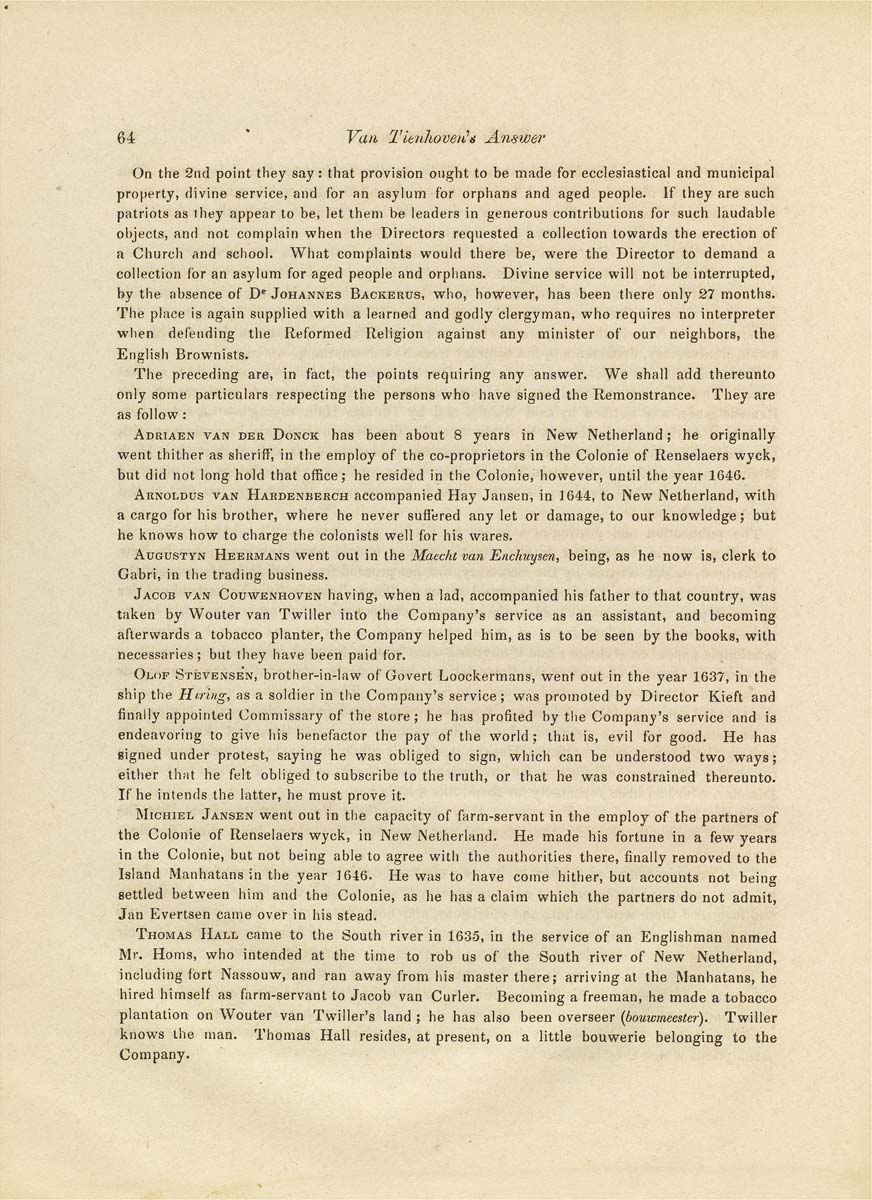64 ' Van TienhovetCs Answer
On the 2nd point they say: that provision ought to be made for ecclesiastical and municipal
property, divine service, and for an asylum for orphans and aged people. If they are such
patriots as they appear to be, let them be leaders in generous contributions for such laudable
objects, and not complain when the Directors requested a collection towards the erection of
a Church and school. What complaints would there be, were the Director to demand a
collection for an asylum for aged people and orphans. Divine service will not be interrupted,
by the absence of D^ Johannes Backerus, who, however, has been there only 27 months.
The place is again supplied with a learned and godly clergyman, who requires no interpreter
when defending the Reformed Religion against any minister of our neighbors, the
English Brownists.
The preceding are, in fact, the points requiring any answer. We shall add thereunto
only some particulars respecting the persons who have signed the Remonstrance. They are
as follow:
Adriaen van der Donck has been about 8 years in New Netherland; he originally
went thither as sheriff", in the employ of the co-proprietors in the Colonie of Renselaers wyck,
but did not long hold that office; he resided in the Colonie, however, until the year 1646.
Arnoldus van Hardenberch accompanied Hay Jansen, in 1644, to New Netherland, with
a cargo for his brother, where he never suffered any let or damage, to our knowledge; but
he knows how to charge the colonists well for his wares.
Augustyn Heermans went out in the Maecht van Enckuysen, being, as he now is, clerk to
Gabri, in the trading business.
Jacob van CouwexMhoven having, when a lad, accompanied his father to that country, was
taken by Wouter van Twiller into the Company's service as an assistant, and becoming
afterwards a tobacco planter, the Company helped him, as is to be seen by the books, with
necessaries; but they have been paid for.
Olof Stevense'n, brother-in-law of Govert Loockermans, went out in the year 1637, in the
ship the Hiring, as a soldier in the Company's service; was promoted by Director Kieft and
finally appointed Commissary of the store; he has profited by tlie Company's service and is
endeavoring to give his benefactor the pay of the world; that is, evil for good. He has
signed under protest, saying he was obliged to sign, which can be understood two ways;
either that he felt obliged to subscribe to the truth, or that he was constrained thereunto.
If he intends the latter, he must prove it.
Michiel Jansen went out in the capacity of farm-servant in the employ of the partners of
the Colonie of Renselaers wyck, in New Netherland. He made his fortune in a few years
in the Colonie, but not being able to agree with the authorities there, finally removed to the
Island Manhatans in the year 1646. He was to have come hither, but accounts not being
settled between him and the Colonie, as he has a claim which the partners do not admit,
Jan Evertsen came over in his stead.
Thomas Hall came to the South river in 1635, in the service of an Englishman named
Mr. Horns, who intended at the time to rob us of the South river of New Netherland,
including fort Nassouw, and ran away from his master there; arriving at the Manhatans, he
hired himself as farm-servant to Jacob van Curler. Becoming a freeman, he made a tobacco
plantation on Wouter van Twiller's land ; he has also been overseer (bouwmeester). Twiller
knows the man. Thomas Hall resides, at present, on a little bouwerie belonging to the
Company.
|








